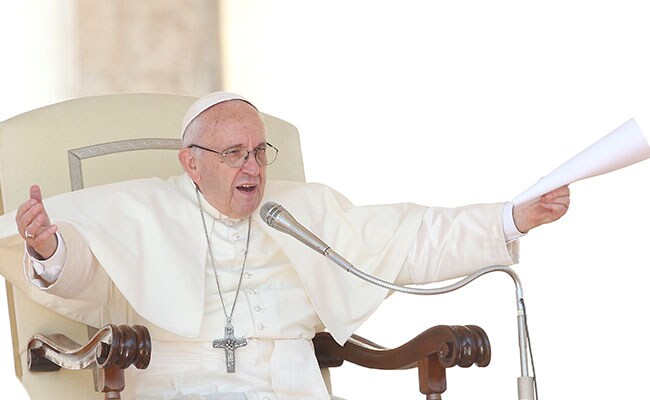Pope Francis said that the Beatitudes — collected in today’s Gospel, Matthew 5, 1-12 — are the “identity card of the Christian” and “the path to holiness.”
Presiding over the Angelus prayer on 1 November, the day on which the Catholic Church celebrates the Solemnity of All Saints, the Pope stressed that in today’s Gospel, “Jesus shows us a path, the path of love, which He Himself first took when He became man, and which for us is both a gift from God and our response. Gift and response.”
Holiness, the Pope stressed, “is a gift from God, because, as St. Paul says, it is He who sanctifies,” and so “it is first of all the Lord whom we ask to sanctify us, to make our hearts like his.”
“With his grace, he heals us and frees us from everything that prevents us from loving as he loves us, so that in us, as Blessed Carlo Acutis said, there is always ‘less of me to make room for God’.”
Pope Francis then stressed that God “offers us his holiness, but does not impose it on us. He plants it in us, makes us taste it and see its beauty, but then awaits our response.”
“He allows us to follow his good inspirations, to let ourselves be involved in his projects, to make his sentiments our own, placing ourselves, as he taught us, at the service of others, with a charity that is ever more universal, open and directed to everyone, to the whole world.”
The Pontiff stressed that “all this” can be seen “in the lives of the saints, even in our time,” and pointed to the testimonies of St. Maximilian Kolbe, St. Mother Teresa of Calcutta and Msgr. Oscar Arnulfo Romero.
Regarding the former, he stressed that “in Auschwitz, he asked to take the place of a father of a family condemned to death,” while regarding the founder of the Missionaries of Charity he emphasized that “she spent her life serving the poorest of the poor.”
In the case of the martyr Archbishop of San Salvador (El Salvador), the Pope stressed that he was “killed at the altar for having defended the rights of the least against the abuses of the arrogant.”
“We can thus list so many saints, so many: those we venerate on the altars and others, whom I like to call the saints ‘next door’, those of every day, the hidden ones, those who lead their daily Christian life,” he said, then exclaiming: “How much hidden holiness there is in the Church!”
“We recognize so many brothers and sisters shaped by the Beatitudes: poor, meek, merciful, hungry and thirsty for justice, peacemakers. They are people ‘full of God’, incapable of remaining indifferent to the needs of others; they are witnesses of luminous paths, which are also possible for us,” he said.
In his remarks after the Angelus, the Holy Father expressed his closeness to the victims of the Isolated Depression at High Levels (DANA), which has caused severe flooding in Spain, especially in the province of Valencia, and has left at least 202 dead.
“Let us pray for the people of the Iberian Peninsula, especially for the Valencian Community, overwhelmed by the storm “DANA”: for the deceased and their loved ones, and for all the affected families. May the Lord support those who suffer and those who bring aid. Our condolences to the people of Valencia,” the Pope said.
The Holy Father also expressed his concern for a recent serious terrorist attack in Chad, in Central Africa, in which 40 soldiers were killed, as well as for those affected by the floods that have affected the country in recent months, which have caused thousands of displaced people.
The Pope reiterated his call to prayer for “martyred Ukraine” and “for Palestine, Israel, Lebanon, Myanmar, Sudan, and for all peoples who suffer because of wars.”
“Brothers and sisters, war is always a defeat, always! And it is despicable because it is the triumph of lies, of falsehood: one seeks the greatest interest for oneself and the greatest harm to the adversary, trampling on human lives, the environment, infrastructure, everything; and all disguised with lies,” he denounced. “And the innocent suffer! I think of the 153 women and children massacred in Gaza in recent days.”
The Eucharist, “the greatest and most effective prayer” for the deceased
The Pope also recalled that November 2nd “will be the annual commemoration of all the faithful departed,” noting that some “go to pray at the tomb of their loved ones.”
“I too will go tomorrow morning to celebrate Mass at the Laurentian cemetery in Rome. Let us not forget: the Eucharist is the greatest and most effective prayer for the souls of the deceased,” he stressed.



